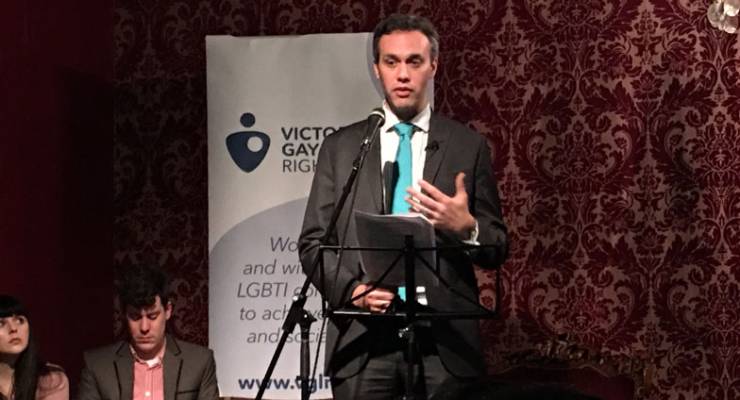
The man appointed by Attorney-General George Brandis to replace former human rights commissioner Tim Wilson when he decided to run for Parliament has said a plebiscite for marriage equality is not necessary — and the push for equality has nothing to do with the Safe Schools program.
Ed Santow, who before being appointed to the Australian Human Rights Commission spent years heading up the Public Interest Advocacy Centre, is now five weeks into his role as Wilson’s replacement. Labor had promised a new dedicated LGBTI commissioner if it won the election, but the Coalition promised that Santow’s role would encompass, but not be specific to, LGBTI issues.
Santow has a long history of LGBTI advocacy despite not being LGBTI-identified himself. His work in the Public Interest Advocacy Centre resulted in the former Labor government in 2012 dropping its opposition to issuing gay couples with certificates of no impediment to allow them to get married overseas.
In recent weeks, Santow’s predecessor, now the Liberal member for Goldstein, has dropped his long-held opposition to the same-sex marriage plebiscite, instead now encouraging LGBTI people to get behind the plebiscite and help win the Yes vote.
[Why the govt needs legislation to hold marriage plebiscite]
Speaking at the Victorian Gay and Lesbian Rights Lobby annual general meeting in Melbourne last night, in one of his first public outings since taking on the role, Santow reiterated that the Human Rights Commission opposed the plebiscite.
“We oppose plebiscites as a way of resolving issues of fundamental rights,” he said.
Opponents of marriage equality believe that the issue is not a human rights issue, because international human rights law doesn’t directly address marriage equality. Santow acknowledged it did not, but he said that the Human Rights Commission accepted that all people were equal before the law, and were entitled, without discrimination, to equal protection.
“There is a broad, emerging, clear consensus from respected authoritative international bodies, as well as courts in comparable countries to Australia. The principles of equality before the law, and non-discrimination demand that marriage be extended beyond heterosexual couples,” he said.
The Human Rights Commission, like everyone, is waiting for the government to release the draft legislation for the proposed plebiscite — legislation that the Greens, the Nick Xenophon Team and Derryn Hinch have already indicated they will oppose. Santow said that in the event a plebiscite went ahead the commission would want to ensure there debate was respectful.
This would mean the Human Rights Commission would try to encourage both sides to not use language that the other found objectionable. The anti-equality side opposes terms like “homophobe” and “bigot” being deployed “too readily”, while Santow said marriage equality advocates had told him they didn’t want to see the debate portrayed as a “referendum on rainbow families” or the Safe Schools program, as the Australian Christian Lobby is trying to frame it at the moment.
“It’s clearly about a change to the definition of marriage and nothing else.”
[Conservative Liberal MPs pushing to delay plebiscite]
Santow said the commission’s role would be trying to urge all advocates to be respectful and keep the debate within bounds that won’t be more harmful than absolutely necessary. This is difficult, as the Australian Christian Lobby is pushing to have state-based anti-discrimination law suspended during the plebiscite and has already succeeded in getting the Tasmanian government to begin watering down its anti-discrimination laws ahead of the plebiscite.
Santow acknowledged there were no federal laws to protect LGBTI people from vilification, and some in the room questioned if it would be effective given that the Human Rights Commission could not ensure a civil debate everywhere — in classrooms, at the dinner table — and not just in the public debates.
On the question of whether there needed to be an 18C-style clause against LGBTI hate speech, Santow said it was more about educating people about the language they use rather than commencing court cases.
“It’s not to generate a huge amount of litigation. It’s largely educational … The whole point of human rights is to help us to live more respectfully as a community. We can still have a discussion as a community about what a respectful debate looks like, and I think we can still go a long way to having that respectful debate whether or not we have legislation that helps to enshrine that kind of societal agreement.”
Santow said people believed marriage equality was inevitable, but he warned that this was the wrong way to look at it.
“Inevitability is a label that can only be issued confidently after the event … It encourages fatalism. It implies that even by remaining passive, the inevitable day will come. It feels like a dangerous game. The status quo tends to grip very tightly.”








Crikey is committed to hosting lively discussions. Help us keep the conversation useful, interesting and welcoming. We aim to publish comments quickly in the interest of promoting robust conversation, but we’re a small team and we deploy filters to protect against legal risk. Occasionally your comment may be held up while we review, but we’re working as fast as we can to keep the conversation rolling.
The Crikey comment section is members-only content. Please subscribe to leave a comment.
The Crikey comment section is members-only content. Please login to leave a comment.